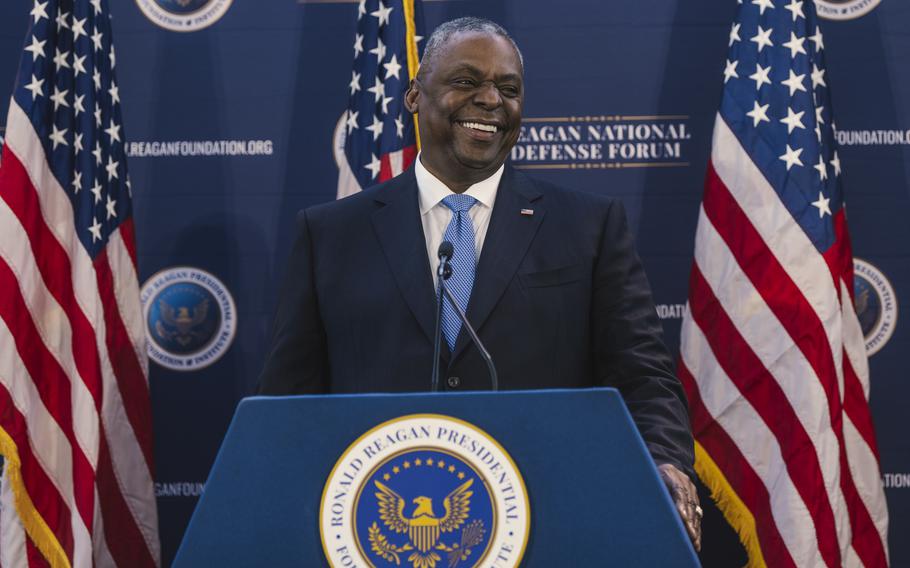
Secretary of Defense Lloyd J. Austin III delivers the keynote address at the 2023 Reagan National Defense Forum at the the Ronald Reagan Presidential Library, Simi Valley, Calif., Dec. 2, 2023. (Chad McNeeley/Department of Defense)
WASHINGTON — Defense Secretary Lloyd Austin was released from Walter Reed National Military Medical Center on Tuesday after being admitted to a critical unit and undergoing non-surgical procedures to correct a bladder problem, the Pentagon and doctors said.
“He is recovering well and resumed his full functions and duties [Tuesday] at 5 p.m.,” the Pentagon said in a statement. “On the advice of his doctors, Secretary Austin will recuperate and perform his duties remotely from home for a period before returning to work at the Pentagon later this week.”
Doctors at Walter Reed said Austin was admitted Sunday with “discomfort and concern” from a bladder issue related to his December surgery for prostate cancer.
“His diagnostic evaluation identified the cause of his bladder issue and it was corrected with non-surgical procedures on Feb. 12,” said John Maddox and Gregory Chesnut, doctors at the medical facility in Bethesda, Md. “He progressed well and was discharged to his home today. He is anticipated to continue his full recovery.”
The statement did not specify what was revealed or what kind of procedures were performed on the secretary.
Austin, 70, was transported at about 2:20 p.m. Sunday to the hospital. At about 4:55 p.m., Austin transferred the functions and duties to Deputy Defense Secretary Kathleen Hicks. Air Force Gen. Charles “CQ” Brown, chairman of the Joint Chiefs of Staff, the White House and Congress were notified.
The doctors said Sunday night that Austin was admitted to a critical care unit after a series of tests and evaluations. They provided an update Monday that Austin underwent non-surgical procedures that required general anesthesia to address his bladder problem.
The secretary canceled his trip to Brussels this week to meet with NATO officials and participate in a Ukraine Defense Contact Group meeting.
“Secretary Austin will no longer travel to Brussels as originally scheduled. However, Wednesday’s Ukraine Defense Contact Group will continue, albeit virtually,” Air Force Maj. Gen. Pat Ryder, the Pentagon’s top spokesman, said Monday.
Austin had surgery in December for prostate cancer and was later hospitalized in January for complications from the procedure. However, he failed to provide proper notification to appropriate government officials.
Austin returned to the Pentagon on Jan. 29 after being absent from the building for nearly a month because of his health. The secretary had been released from Walter Reed on Jan. 15 after spending about two weeks there following the surgery, which was conducted Dec. 22.
Austin faced public scrutiny after he failed to notify President Joe Biden and other government officials about his illness and hospitalization. His actions have sparked several reviews of what took place.
The Pentagon announced Thursday that it completed its internal review of Austin’s hospitalization, which the defense secretary is now reviewing himself. Austin is also scheduled to testify before the House Armed Services Committee on Feb. 29 about his failure to notify the needed officials about his illness.
He did address reporters at the Pentagon on Feb. 1 and apologized for not disclosing his prostate diagnosis, the surgery that followed and complications that led to an extended hospital stay.
“I want to be crystal clear: We did not handle this right. I did not handle this right,” he said. “I should have told the president about my cancer diagnosis. I should have told my team and the American people, and I take full responsibility.”
His cancer was discovered during a regular health screening in early December. He was admitted to the hospital about three weeks later for surgery, which required general anesthesia. He left the hospital the following morning.
On Jan. 1, Austin returned to Walter Reed after experiencing pain in his abdomen, hip and leg. He was later found to have a urinary tract infection, and Austin spent days in the intensive care unit.
But during Austin’s medical treatments, no one at the Defense Department notified the White House, Hicks, Congress or the public for several days. Biden did not learn of Austin’s prostate cancer until Jan. 9.